人教版(2019))必修第一册Unit 4 Natural disasters 定语从句课件 (85张ppt)
文档属性
| 名称 | 人教版(2019))必修第一册Unit 4 Natural disasters 定语从句课件 (85张ppt) | 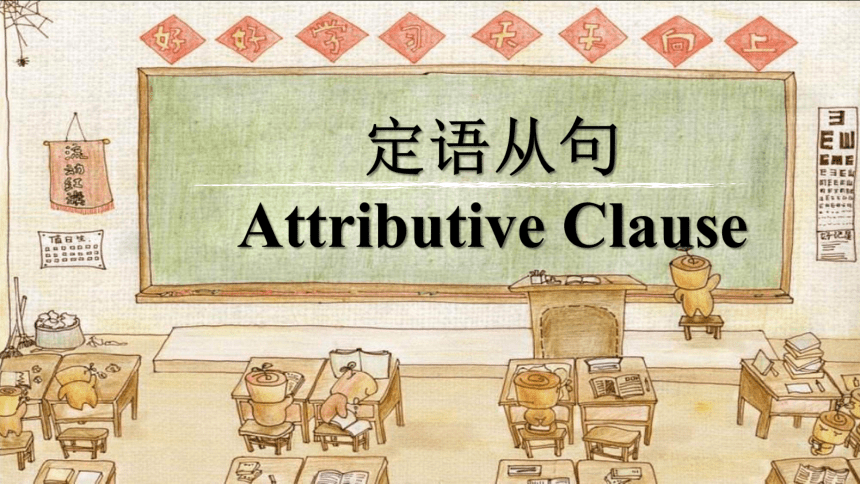 | |
| 格式 | zip | ||
| 文件大小 | 18.2MB | ||
| 资源类型 | 教案 | ||
| 版本资源 | 人教版(2019) | ||
| 科目 | 英语 | ||
| 更新时间 | 2022-07-20 19:39:36 | ||
图片预览

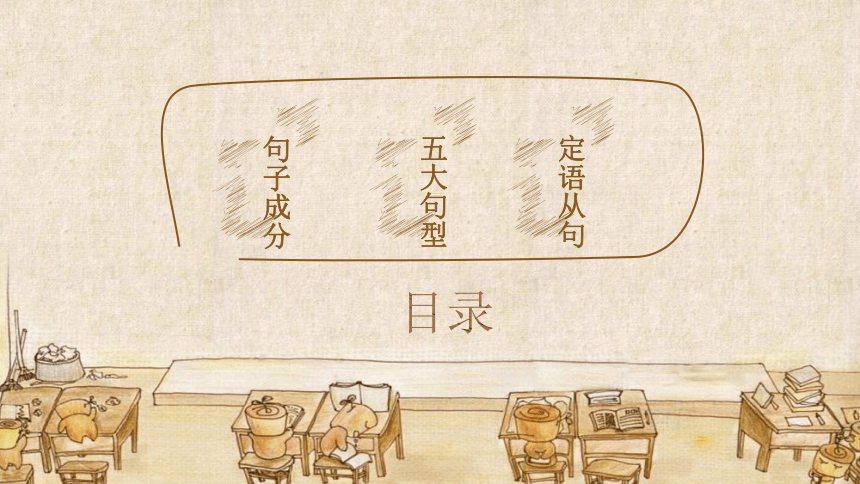
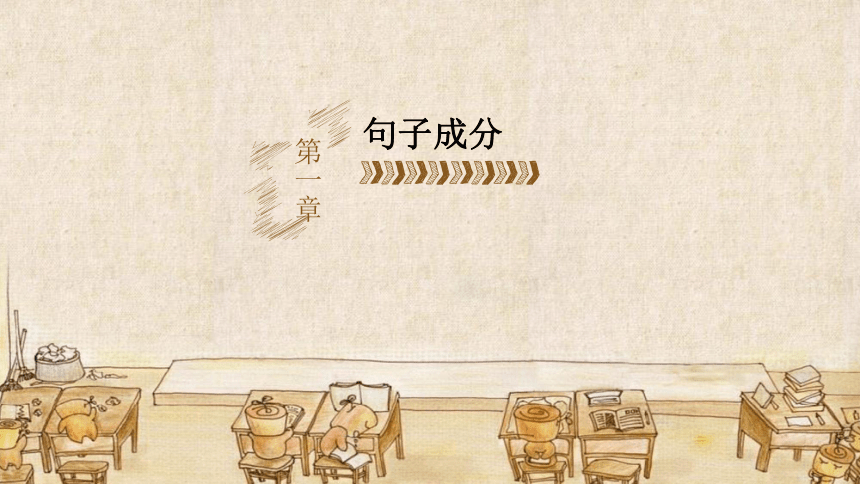
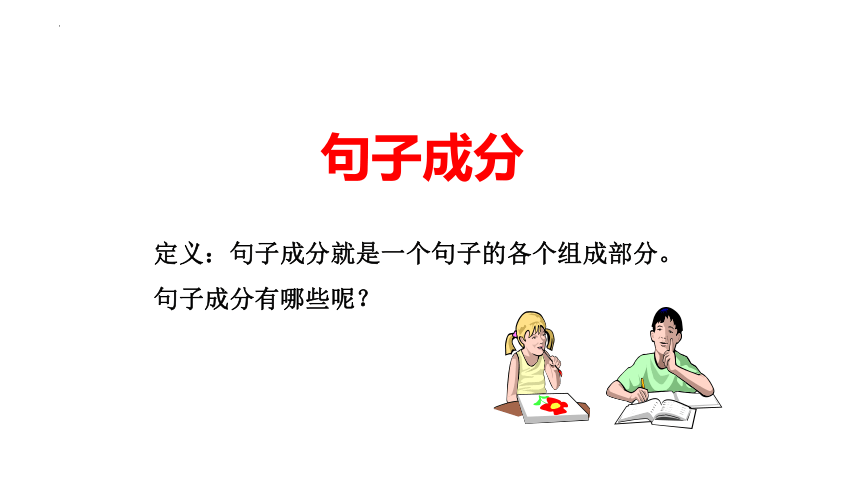
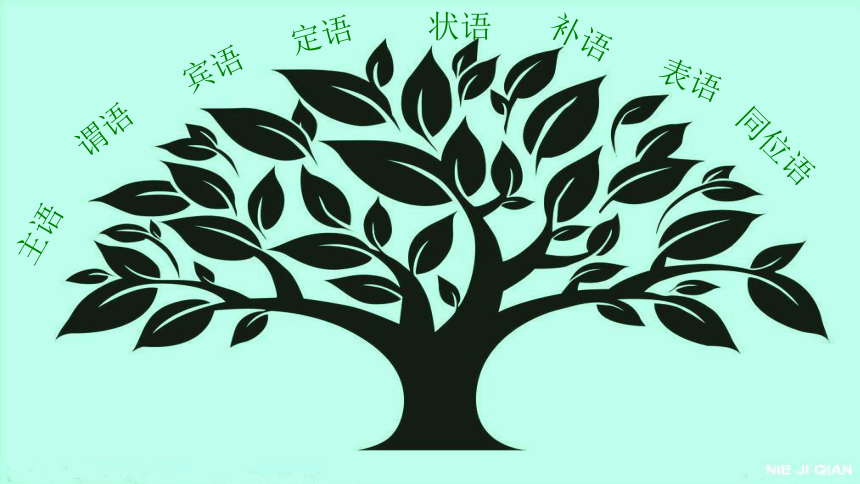
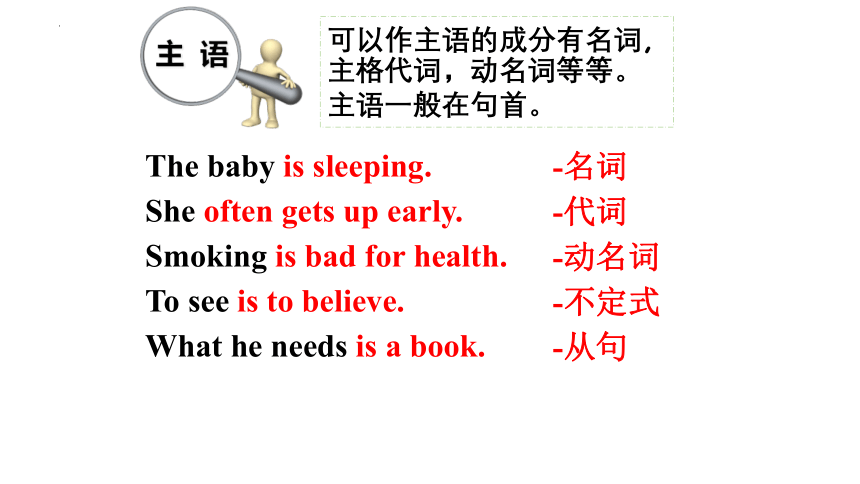
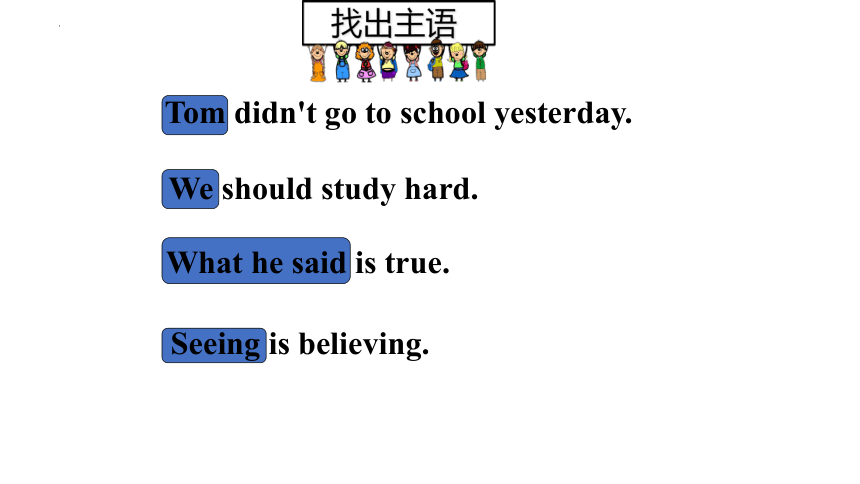
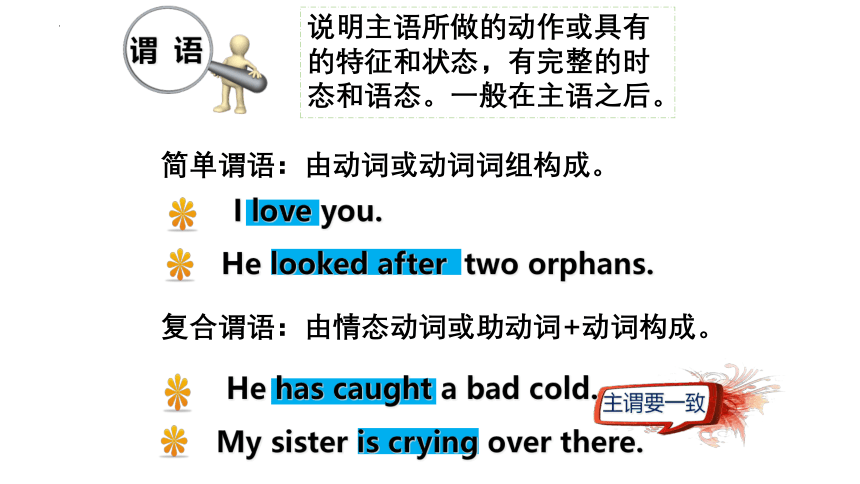
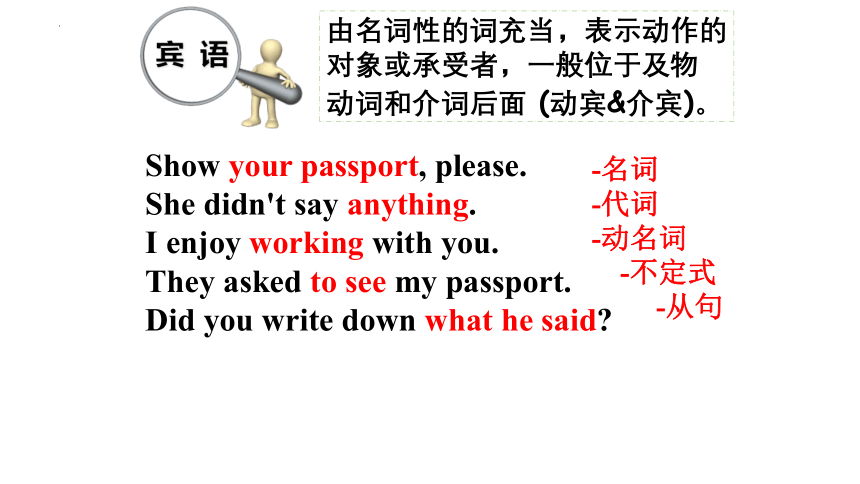
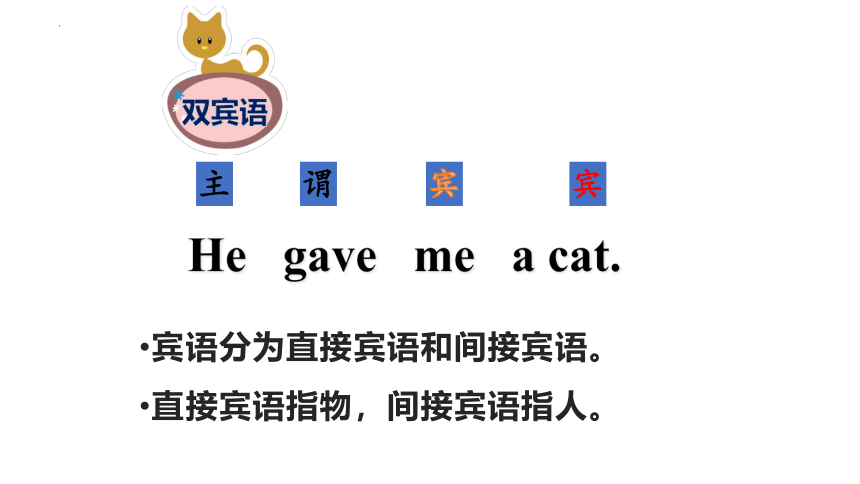
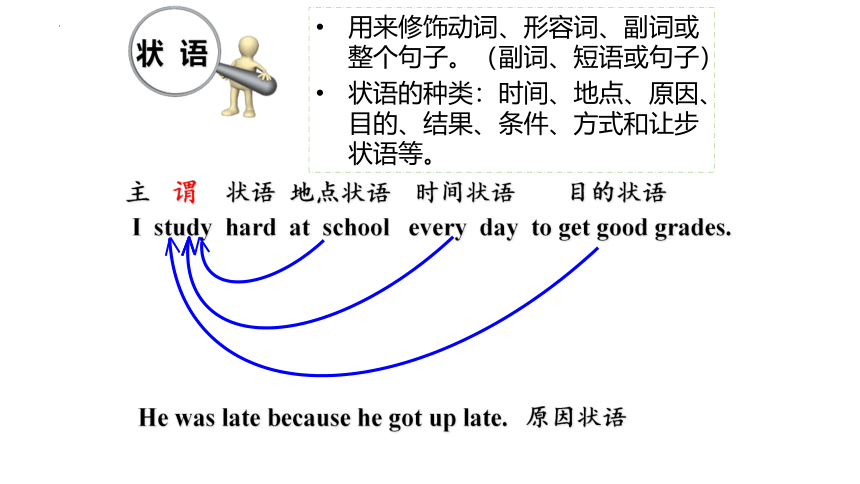
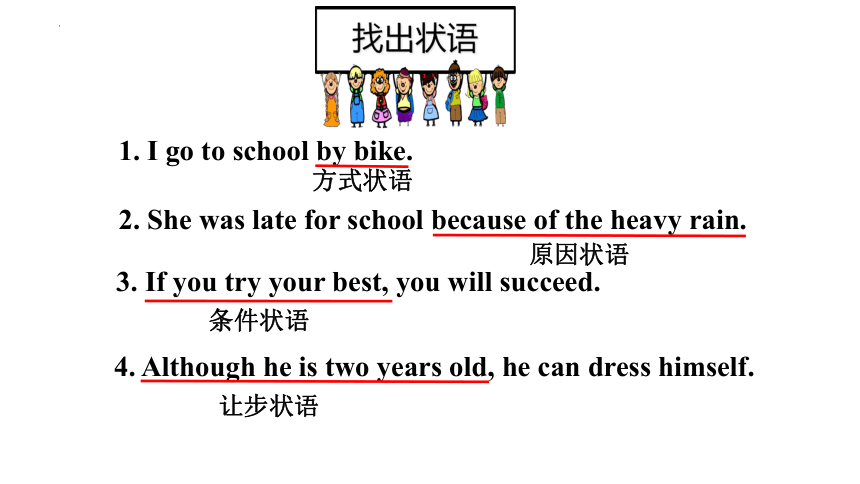
文档简介
(共85张PPT)
定语从句
Attributive Clause
目录
句子成分
五大句型
定语从句
句子成分
第一章
句子成分
定义:句子成分就是一个句子的各个组成部分。
句子成分有哪些呢?
主语
谓语
宾语
补语
定语
状语
表语
同位语
主 语
The baby is sleeping.
She often gets up early.
Smoking is bad for health.
To see is to believe.
What he needs is a book.
-名词
-代词
-动名词
-不定式
-从句
可以作主语的成分有名词,
主格代词,动名词等等。
主语一般在句首。
We should study hard.
Tom didn't go to school yesterday.
What he said is true.
Seeing is believing.
找出主语
主谓要一致
谓 语
I love you.
He has caught a bad cold.
说明主语所做的动作或具有的特征和状态,有完整的时态和语态。一般在主语之后。
He looked after two orphans.
简单谓语:由动词或动词词组构成。
复合谓语:由情态动词或助动词+动词构成。
My sister is crying over there.
宾 语
Show your passport, please.
She didn't say anything.
I enjoy working with you.
They asked to see my passport.
Did you write down what he said
-名词
-代词
-动名词
-不定式
-从句
由名词性的词充当,表示动作的
对象或承受者,一般位于及物
动词和介词后面 (动宾&介宾)。
He gave me a cat.
双宾语
主
谓
宾
宾
宾语分为直接宾语和间接宾语。
直接宾语指物,间接宾语指人。
状 语
I study hard at school every day to get good grades.
主
谓
状语
地点状语
时间状语
目的状语
用来修饰动词、形容词、副词或整个句子。(副词、短语或句子)
状语的种类:时间、地点、原因、目的、结果、条件、方式和让步状语等。
He was late because he got up late.
原因状语
找出状语
1. I go to school by bike.
方式状语
2. She was late for school because of the heavy rain.
原因状语
3. If you try your best, you will succeed.
条件状语
4. Although he is two years old, he can dress himself.
让步状语
宾 补
Rainy days make me sad.
主
谓
宾
宾补
位于宾语之后,对宾语进行补充说明,使句子的意义完整。
常有宾补的及物动词有:make, consider, find, see, get, have, let, call。
宾 补
I found the book interesting.
Do you hear Tom singing
He made himself understood.
She asked me to lend her a hand.
Please make yourself at home.
Please keep the dog out.
We must keep it a secret.
形容词
现在分词
过去分词
动词不定式
介词短语
副词
名词
找出宾补
They call me Lily .
I saw Mr. Wang get on the bus.
主
谓
宾
宾补
主
谓
宾
宾补
表 语
Her mother is a teacher.
主
系动词
表
The flower smells sweet.
Seeing is believing.
位于系动词之后,
表示主语“是什么”
或“怎么样”。
He stays healthy by exercising.
系动词
be动词:表示主语状态、身份等。
I am hungry.
状态系动词:表示继续保持一种状况,主要有keep, stay等。
Leaves turn yellow in autumn.
树叶(leaf)
感官系动词 主要有feel, smell, sound, taste, look等。
You look great today.
变化系动词 表示主语变化,主要有become, turn, get等。
找出表语
Everything looks nice.
His face turned red.
He is happy.
五大基本句型
第二章
Read this poem and recognize
the sentence types.
Spring is coming.
Leaves turn green.
Cows eat grass.
The spring gives us a warm hug.
I will make the beauty stay in my mind forever.
主语
谓语
主语
主语
主语
主语
系动词
谓语
谓语
谓语
表语
宾语
间宾
宾语补足语
宾语
直宾
定语从句
第三章
教学目标
1.何为定语从句?
2.定语从句常用关系词?
3.定语从句的构成?
4.先行词和关系词的关系
5.定语从句的翻译?
什么是定语?
Attribute (定语)
修饰;限定的作用
找出下列句中的定语。
1. He is an honest boy.
2. We love our country.
3. What’s your telephone number
4. She is a beautiful girl.
honest
our
your
beautiful
找出下列句子中的定语:
1. Ai Yanling is a chemistry teacher.
2. He is our friend.
3. We belong to the third world.
4. He decided to teach the lazy boy a lesson.
5. The man over there is my old friend.
6. The woman with a baby in her arms is my sister.
7. The boys playing football are in Class 2.
8. The trees planted last year are growing well now.
9. I have an idea to do it well.
10. You should do everything that I do.
名词
代词
数词
形容词
副词短语
代词
形容词
介词短语
代词
现在分词
过去分词
不定式
定语从句
The positions of the attribute:(定语的位置)
1. She is a beautiful girl.
2. She is a girl with long hair.
3. She is a girl who is beautiful.
(美丽的)
(长头发的)
(美丽的)
通常情况下,单个词作定语时要放于被修饰词的前面,短语或从句作定语时要放于被修饰词的后面。起修饰限定的作用,译作“……的”
The structures of the attributive clause:
(定语从句的结构)
在复合句中,修饰某一名词或代词的从句叫做
定语从句(句意:“……的”)
被定语从句所修饰的名词或代词叫做“ 先行词 ”。
引导定语从句的词叫“ 关系词 ”。
He is an English teacher who likes singing songs.
定语从句
先行词
关系代词
The structures of the attributive clause:
(定语从句的结构)
定语从句(缺少主语/宾语/表语/定语/状语)
名词或代词
关系代词/关系副词
先行词 + 关系词 + 从句
Find the attributive clause out:
Do you know the man who spoke just now
The fish that we bought yesterday were not fresh.
He finally worked out the problem which puzzled him for a long time.
There is a mountain whose top is always covered with snow.
August 8th, 2008 is the day when the 29th Olympic Games were held in Beijing.
关系词又分为两派:
左边这路是关系代词,主要有这六个家伙
右边这路是关系副词,有这三个家伙
关系代词&关系副词
只指代人
只指代事物
人、物皆可
指地点
指时间
指原因
who,whom
which
that, whose, as
where
when
why
关系代词
关系副词
作定语从句中的主语、宾语、定语等
作定语从句中的状语
关系词的作用:
e.g. This is the car which he bought last year.
先行词
定语从句
关系代词
关系词的作用
1
引导定语从句
2
代替先行词
3
在从句中担当成分
Find the attributive clause out:
Do you know the man who spoke just now
The fish that we bought yesterday were not fresh.
He finally worked out the problem which puzzled him for a long time.
There is a mountain whose top is always covered with snow.
August 8th, 2008 is the day when the 29th Olympic Games were held in Beijing.
关系词如何选择?
①找主句、从句;②找先行词
③把先行词放入从句,看先行词在从句中充当的成分,缺啥补啥
Do you know the man who spoke just now
The fish that we bought yesterday were not fresh.
He finally worked out the problem which puzzled him for a long time.
There is a mountain whose top is always covered with snow.
August 8th, 2008 is the day when the 29th Olympic Games were held in Beijing.
He is a famous singer __________ has published many songs.
who/that
It is a musical program_________ can help ordinary music lovers achieve their dreams in Zhejiang TV.
which/that
It is a very popular novel __________ J.K. Rowling created.
(which/that)
She is a famous athlete _____________ fans come from all over the world.
(whose)
He is the first black American _____________ the American people have elected (选举)as president (总统).
(whom/that)
It is a cell phone software(软件)_______ function (功能) is to chat with others and send messages, pictures and videos.
whose
定语从句解题三部曲:
①找主句、从句;
②找到先行词;
③把先行词放入从句中,看充当什么成分,缺啥补啥。
Join the following sentences:
The girl is Mary. We saw her yesterday.
The girl we saw her yesterday is Mary.
The girl her we saw yesterday is Mary.
The girl that/whom/who/略 we saw yesterday is Mary.
①that先行词可以是人或物,可以作定语从句的主语和宾语,作宾语可省略.
Join the following sentences:
I like the book. You bought the book yesterday.
I like the book you bought the book yesterday.
I like the book the book you bought yesterday.
I like the book which/略 you bought yesterday.
②which先行词是物,作定语从句的主语或宾语,作宾语可省略.
Join the following sentences:
The man is a worker. The man is speaking at the meeting.
The man the man is speaking at the meeting is a worker.
The man the man is speaking at the meeting is a worker.
The man who is speaking at the meeting is a worker.
③who先行词是人作定语从句的主语或宾语,作宾语可省略.
Join the following sentences:
The woman is a teacher. They wanted to visit the woman.
The woman is a teacher they wanted to visit the woman.
The woman is a teacher the woman they wanted to visit .
The woman is a teacher whom/略 they wanted to visit .
④ whom 先行词是人,作定语从句的宾语,作宾语可省略.
Join the following sentences:
The woman is a teacher. The woman’s hair is red.
The woman is a teacher the woman’s hair is red.
The woman is a teacher the woman’s hair is red.
The woman is a teacher whose hair is red.
⑤ whose 先行词是人或物,作定语从句的定语。
成分 指代 主语 宾语 定语
指人 who whom/ who whose
指物 which which whose
指人或物 that that whose
关系代词在定语从句中作宾语可省略
例 1: The man __________ gave you the talk yesterday is our teacher.
that/who
指人: that/who (主语)
例2: The boy_________________ the nurse is looking after is my friend.
(who/whom/that/略)
指人: who/whom/that(宾语,可省略)
例4: The question_______________ I don’t know is about grammar.
(that/which/略)
指物: that/which (宾语,可省略)
例3: The car________________ is red was damaged yesterday.
that/which
指物: that/which (主语)
例5:Yesterday she talked with one woman ____ husband died in that accident.
A. which B. whose
C. of which D. that
B
关系代词表示先行词的所属关系,指人和物时都用whose,可理解为“…的”
that和which在指物的情况下一般都可以互换, 但在下列情况下, 一般用that而不用which。
She has something that you can borrow.
(1) 先行词为不定代词all, everything, nothing, much, something,anything, little等,that来把which踹。
I’ve read all the books that are not mine.
This is the first tree that he has planted.
This is the very book that I want to read.
(2)先行词被特定缠,that抢先把位占。
(3)先行词前序高级,使用that必无疑。
all, every, no, some, any, little, much, the only, the very, the same, the last
(4)先行词为人和物,that来当顶梁柱。
The film star and her film that you have just talked about are well-known.
(5)先行词在特疑中,避免重复that冲。
Who is the man that is standing there
Which is the T-shirt that fits me most
(5)关系词做表语,只用that。
Our village is no longer the place_______ it used to be.
that
下列情况中,定语从句中关系代词一般用that而不用which:
先行词为all, everything, nothing, something, anything, little,
much 等不定代词时。
2. 先行词被all, every, no, some, any, little, much等修饰时。
3. 先行词被序数词或形容词最高级修饰时。
4. 先行词被the only, the very, the same, the last修饰时。
5. 先行词既有人又有物的时候,只能用that。
6.关系词做表语,只用that。
Summary
小试牛刀
1)Anything ____ can burn is a source of heat energy.
2)This is the very book ______ I’m looking for .
3)They talked about things and persons _______ they remembered in the school.
4)Which is the book _______ you lost
5)This is the best film ______ I have ever seen.
6)Please get ready for everything _____ we need.
7)This is the watch___________ I lost yesterday.
that
that
that
that
that
that
that/which
只用which而不用that的情况:
1.在非限定性定语从句中的用法
Carol said the work should be done by October, ________ personally, I doubt very much.
A.it B. that C. when D. which
D
2.非限制性定语从句:非限制性定语从句中的附加信息可以省去,没有了附加信息,我们仍能知道清楚谈论的是谁,什么事,这样的从句使用逗号.
e.g. He has a son , who has gone abroad for further study.
定语从句的种类:
1.限制性定语从句: 对先行词起修饰和限定作用,是不可缺少的成分,没有了附加信息,我们就不知道谈论的是谁或是什么事,在这样的从句中不使用逗号.
e.g. Those who respect others are usually respected by others.
限制 性定语从句 非限制性定语从句
形式上 ________逗号 ________逗号
意义上 去掉后句意_____ 去掉后句意_____
作用上 修饰限制 可修饰_________ 补充说明
可修饰___________
关系代词 that/which/who/whom/as which/who/whom
不完整
不用
用
完整
先行词或主句
先行词
Difference
① Tom found the ancient book, which was broken.
④ I like the house, whose windows face the sea.
③ He went abroad, which was unexpected.
Find the non-attributive clauses out and translate them:
② The man who is under the tree is my teacher.
⑤ The girl whose leg broke in the earthquake is taken to a hospital .
只用which而不用that的情况:
2.关系代词前面有介词,只能用介词+which:
My glasses,_____ I was like a blind man, fell to the ground and broke.
which B. with which
C. without D without which
D
只用which而不用that的情况:
3.当先行词本身就是that时,宜用which:
That ______ you told him about is what we want to know.
A. that B.which
C.as D.whose
只用who的情况:
1. all指作先行词,且表示人时,用who
All _______ have studied this question have come to the same conclusion.
who
注意:如果all 表示是物的时, 就用that
All that can be done has been done.
2.先行词是those,且指人时.
Those ______ want to go to the cinema will have to wait at the gate of the school.
who
3.在there be 结构中,先行词是人.
There is a young lady _______ asks for you.
who
4.当先行词是指人的不定代词,如:one ,anyone, no one, anybody.
The student you should learn from is the one _______ works hard and studies well.
who
高考题例:These houses are sold at such a low price______people expected.(2000高考题)
like B. as C. that D. which
as 的用法:
【解题技巧】:
as作为关系代词用时,引导限定性定语从句通常用于“the same…as” 和“such…as”句型中。
在从句中作成分
Such…as …
Such …that ...
She had such a fright that she ran away.
引导定语从句;意为像….一样;正如
These houses are sold at such a low price as people expected.
引导结果状语从句;意为….以至…
完整的句子.
the same …as…
the same … that..
This is the same watch as I lost.
This is the same watch that I lost
这个手表跟我丢的有点像.
这就是我丢的手表.
强调相似性
强调同一性
1、as引导非限定性定语从句时可以放在句首,代替下面的从句,而which不能。
2、as引导的定语从句有“正如”之意, (从句谓语动词常用:see, know, expect, discover,mention等搭配)而which引导的定语从句没有此意。
as与which引导非限定性定语从句的用法和区别
1. ______ is known to everybody, the moon travels round the earth once every month.
It B. As C. That D. What
比较: _______ is known to everybody that the moon travels round the earth once every month.
It
as 与which 的意义区别
as 有” 正如,就像”之意,表示符合人们的认识,事情发展的特征等,即从句与主句的语意往往一致.
如果主句与从句的语意不一致时,用which.
They remarried,____ we had expected.
They remarried,______ we hadn`t expected.
as
which
他们复婚了,正如我们所期待的.
他们复婚了,那是我们所意料不到的.
Way 做先行词,其后的关系词可用
I don’t like_____you speak to her.
A.the way B.the way in that
C.the way which D.the way of which
A
in which /that/不填
1.Is there anything else_____you want
A.which B.that C.who D.what
2.The last place _____we visited was the Great Wall.
A.which B.that C.where D. it
Choose the best answers:
3. I don’t like ____ you speak to her.
A. the way B. the way in that
C. the way which D. the way of which
4.The famous basketball star, ____ tried to make a come-back, attracted a lot of attention.
A. where B. when C. which D. Who
5.Her sister has become a lawyer, _______ she wanted to be.
A.who B. that C. what D. which
6. Please take the second chair______is over there.
A. where B. which C. who D. that
d关系副词:
when,where,why
when 指时间 作时间状语
where 指地点 作地点状语
why 指原因 作原因状语
d介词+关系代词(宾格):
指物:in which,on which,of which,from which…
指人:to whom,with whom,from whom…
【解题技巧】:选择关系代词与关系副词的关键取决于关系词在从句中作主语、宾语、表语、定语时,只能用关系代词;如果关系词在从句中作状语(时间、地点、原因)则用副词。
She was educated at Peking University she went on to study.
A.what B. which C.that D. where
D
关系副词的用法
注意: 它在从句中充当状语成分,一般来说,这个句子的主谓宾都是完整的.
关系副词( where, when,why)
介词+ which
I will never forget the day.
I first went to school on the day.
I will never forget the day _____ I first went to school.
I will never forget the day ________ I first went to school.
when
on which
Last week we visited the factory.
My brother works there.
Last week we visited the factory ______ my brother works.
Last week we visited the factory ________ my brother works.
Last week we visited the factory ___________ my brother works in.
where
(which/that/ /)
in which
The reason was not clear.
He didn’t come for the reason.
The reason _____ he didn’t come was not clear.
The reason _________ he didn’t come was not clear.
why
for which
比较:
The reason ___________ you gave me is unacceptable.
(that / which )
I will remember the day ____ I stayed with him.
I will remember the day ____ I spent with him.
when
/ on which
I will remember the day.
I stay with him on the day.
时间状语
I will remember the day.
I spent the day with him.
宾语
which/ that/ /
比较题目,弄清关系代词
关系副词
关系代词
This is a school __________ my father worked.
This is a school ___________ my father visited.
where
/ in which
which/that/ /
关于定语从句的难点和出错点.
1.定语从句的从句部分出现代替的内容.
This is the book that I like it best.
2.插入语成分.
The beggar who I think is poor is in fact rich.
从句部分
3.分隔定语从句
由于句子内容或结构的需要,中间插入了其他成分将定语从句与先行词隔开.
The days are gone forever when the Chinese people used “ foreign oil”.
The days when the Chinese people used “foreign oil” are gone forever.
头重脚轻的问题.
4.定语从句中的主谓一致问题.
1.She is one of the girls who _____ praised at the meeting.
2.She is the only one of the girls who _____ praised at the meeting. ( be )
are
is
THANK YOU
定语从句
Attributive Clause
目录
句子成分
五大句型
定语从句
句子成分
第一章
句子成分
定义:句子成分就是一个句子的各个组成部分。
句子成分有哪些呢?
主语
谓语
宾语
补语
定语
状语
表语
同位语
主 语
The baby is sleeping.
She often gets up early.
Smoking is bad for health.
To see is to believe.
What he needs is a book.
-名词
-代词
-动名词
-不定式
-从句
可以作主语的成分有名词,
主格代词,动名词等等。
主语一般在句首。
We should study hard.
Tom didn't go to school yesterday.
What he said is true.
Seeing is believing.
找出主语
主谓要一致
谓 语
I love you.
He has caught a bad cold.
说明主语所做的动作或具有的特征和状态,有完整的时态和语态。一般在主语之后。
He looked after two orphans.
简单谓语:由动词或动词词组构成。
复合谓语:由情态动词或助动词+动词构成。
My sister is crying over there.
宾 语
Show your passport, please.
She didn't say anything.
I enjoy working with you.
They asked to see my passport.
Did you write down what he said
-名词
-代词
-动名词
-不定式
-从句
由名词性的词充当,表示动作的
对象或承受者,一般位于及物
动词和介词后面 (动宾&介宾)。
He gave me a cat.
双宾语
主
谓
宾
宾
宾语分为直接宾语和间接宾语。
直接宾语指物,间接宾语指人。
状 语
I study hard at school every day to get good grades.
主
谓
状语
地点状语
时间状语
目的状语
用来修饰动词、形容词、副词或整个句子。(副词、短语或句子)
状语的种类:时间、地点、原因、目的、结果、条件、方式和让步状语等。
He was late because he got up late.
原因状语
找出状语
1. I go to school by bike.
方式状语
2. She was late for school because of the heavy rain.
原因状语
3. If you try your best, you will succeed.
条件状语
4. Although he is two years old, he can dress himself.
让步状语
宾 补
Rainy days make me sad.
主
谓
宾
宾补
位于宾语之后,对宾语进行补充说明,使句子的意义完整。
常有宾补的及物动词有:make, consider, find, see, get, have, let, call。
宾 补
I found the book interesting.
Do you hear Tom singing
He made himself understood.
She asked me to lend her a hand.
Please make yourself at home.
Please keep the dog out.
We must keep it a secret.
形容词
现在分词
过去分词
动词不定式
介词短语
副词
名词
找出宾补
They call me Lily .
I saw Mr. Wang get on the bus.
主
谓
宾
宾补
主
谓
宾
宾补
表 语
Her mother is a teacher.
主
系动词
表
The flower smells sweet.
Seeing is believing.
位于系动词之后,
表示主语“是什么”
或“怎么样”。
He stays healthy by exercising.
系动词
be动词:表示主语状态、身份等。
I am hungry.
状态系动词:表示继续保持一种状况,主要有keep, stay等。
Leaves turn yellow in autumn.
树叶(leaf)
感官系动词 主要有feel, smell, sound, taste, look等。
You look great today.
变化系动词 表示主语变化,主要有become, turn, get等。
找出表语
Everything looks nice.
His face turned red.
He is happy.
五大基本句型
第二章
Read this poem and recognize
the sentence types.
Spring is coming.
Leaves turn green.
Cows eat grass.
The spring gives us a warm hug.
I will make the beauty stay in my mind forever.
主语
谓语
主语
主语
主语
主语
系动词
谓语
谓语
谓语
表语
宾语
间宾
宾语补足语
宾语
直宾
定语从句
第三章
教学目标
1.何为定语从句?
2.定语从句常用关系词?
3.定语从句的构成?
4.先行词和关系词的关系
5.定语从句的翻译?
什么是定语?
Attribute (定语)
修饰;限定的作用
找出下列句中的定语。
1. He is an honest boy.
2. We love our country.
3. What’s your telephone number
4. She is a beautiful girl.
honest
our
your
beautiful
找出下列句子中的定语:
1. Ai Yanling is a chemistry teacher.
2. He is our friend.
3. We belong to the third world.
4. He decided to teach the lazy boy a lesson.
5. The man over there is my old friend.
6. The woman with a baby in her arms is my sister.
7. The boys playing football are in Class 2.
8. The trees planted last year are growing well now.
9. I have an idea to do it well.
10. You should do everything that I do.
名词
代词
数词
形容词
副词短语
代词
形容词
介词短语
代词
现在分词
过去分词
不定式
定语从句
The positions of the attribute:(定语的位置)
1. She is a beautiful girl.
2. She is a girl with long hair.
3. She is a girl who is beautiful.
(美丽的)
(长头发的)
(美丽的)
通常情况下,单个词作定语时要放于被修饰词的前面,短语或从句作定语时要放于被修饰词的后面。起修饰限定的作用,译作“……的”
The structures of the attributive clause:
(定语从句的结构)
在复合句中,修饰某一名词或代词的从句叫做
定语从句(句意:“……的”)
被定语从句所修饰的名词或代词叫做“ 先行词 ”。
引导定语从句的词叫“ 关系词 ”。
He is an English teacher who likes singing songs.
定语从句
先行词
关系代词
The structures of the attributive clause:
(定语从句的结构)
定语从句(缺少主语/宾语/表语/定语/状语)
名词或代词
关系代词/关系副词
先行词 + 关系词 + 从句
Find the attributive clause out:
Do you know the man who spoke just now
The fish that we bought yesterday were not fresh.
He finally worked out the problem which puzzled him for a long time.
There is a mountain whose top is always covered with snow.
August 8th, 2008 is the day when the 29th Olympic Games were held in Beijing.
关系词又分为两派:
左边这路是关系代词,主要有这六个家伙
右边这路是关系副词,有这三个家伙
关系代词&关系副词
只指代人
只指代事物
人、物皆可
指地点
指时间
指原因
who,whom
which
that, whose, as
where
when
why
关系代词
关系副词
作定语从句中的主语、宾语、定语等
作定语从句中的状语
关系词的作用:
e.g. This is the car which he bought last year.
先行词
定语从句
关系代词
关系词的作用
1
引导定语从句
2
代替先行词
3
在从句中担当成分
Find the attributive clause out:
Do you know the man who spoke just now
The fish that we bought yesterday were not fresh.
He finally worked out the problem which puzzled him for a long time.
There is a mountain whose top is always covered with snow.
August 8th, 2008 is the day when the 29th Olympic Games were held in Beijing.
关系词如何选择?
①找主句、从句;②找先行词
③把先行词放入从句,看先行词在从句中充当的成分,缺啥补啥
Do you know the man who spoke just now
The fish that we bought yesterday were not fresh.
He finally worked out the problem which puzzled him for a long time.
There is a mountain whose top is always covered with snow.
August 8th, 2008 is the day when the 29th Olympic Games were held in Beijing.
He is a famous singer __________ has published many songs.
who/that
It is a musical program_________ can help ordinary music lovers achieve their dreams in Zhejiang TV.
which/that
It is a very popular novel __________ J.K. Rowling created.
(which/that)
She is a famous athlete _____________ fans come from all over the world.
(whose)
He is the first black American _____________ the American people have elected (选举)as president (总统).
(whom/that)
It is a cell phone software(软件)_______ function (功能) is to chat with others and send messages, pictures and videos.
whose
定语从句解题三部曲:
①找主句、从句;
②找到先行词;
③把先行词放入从句中,看充当什么成分,缺啥补啥。
Join the following sentences:
The girl is Mary. We saw her yesterday.
The girl we saw her yesterday is Mary.
The girl her we saw yesterday is Mary.
The girl that/whom/who/略 we saw yesterday is Mary.
①that先行词可以是人或物,可以作定语从句的主语和宾语,作宾语可省略.
Join the following sentences:
I like the book. You bought the book yesterday.
I like the book you bought the book yesterday.
I like the book the book you bought yesterday.
I like the book which/略 you bought yesterday.
②which先行词是物,作定语从句的主语或宾语,作宾语可省略.
Join the following sentences:
The man is a worker. The man is speaking at the meeting.
The man the man is speaking at the meeting is a worker.
The man the man is speaking at the meeting is a worker.
The man who is speaking at the meeting is a worker.
③who先行词是人作定语从句的主语或宾语,作宾语可省略.
Join the following sentences:
The woman is a teacher. They wanted to visit the woman.
The woman is a teacher they wanted to visit the woman.
The woman is a teacher the woman they wanted to visit .
The woman is a teacher whom/略 they wanted to visit .
④ whom 先行词是人,作定语从句的宾语,作宾语可省略.
Join the following sentences:
The woman is a teacher. The woman’s hair is red.
The woman is a teacher the woman’s hair is red.
The woman is a teacher the woman’s hair is red.
The woman is a teacher whose hair is red.
⑤ whose 先行词是人或物,作定语从句的定语。
成分 指代 主语 宾语 定语
指人 who whom/ who whose
指物 which which whose
指人或物 that that whose
关系代词在定语从句中作宾语可省略
例 1: The man __________ gave you the talk yesterday is our teacher.
that/who
指人: that/who (主语)
例2: The boy_________________ the nurse is looking after is my friend.
(who/whom/that/略)
指人: who/whom/that(宾语,可省略)
例4: The question_______________ I don’t know is about grammar.
(that/which/略)
指物: that/which (宾语,可省略)
例3: The car________________ is red was damaged yesterday.
that/which
指物: that/which (主语)
例5:Yesterday she talked with one woman ____ husband died in that accident.
A. which B. whose
C. of which D. that
B
关系代词表示先行词的所属关系,指人和物时都用whose,可理解为“…的”
that和which在指物的情况下一般都可以互换, 但在下列情况下, 一般用that而不用which。
She has something that you can borrow.
(1) 先行词为不定代词all, everything, nothing, much, something,anything, little等,that来把which踹。
I’ve read all the books that are not mine.
This is the first tree that he has planted.
This is the very book that I want to read.
(2)先行词被特定缠,that抢先把位占。
(3)先行词前序高级,使用that必无疑。
all, every, no, some, any, little, much, the only, the very, the same, the last
(4)先行词为人和物,that来当顶梁柱。
The film star and her film that you have just talked about are well-known.
(5)先行词在特疑中,避免重复that冲。
Who is the man that is standing there
Which is the T-shirt that fits me most
(5)关系词做表语,只用that。
Our village is no longer the place_______ it used to be.
that
下列情况中,定语从句中关系代词一般用that而不用which:
先行词为all, everything, nothing, something, anything, little,
much 等不定代词时。
2. 先行词被all, every, no, some, any, little, much等修饰时。
3. 先行词被序数词或形容词最高级修饰时。
4. 先行词被the only, the very, the same, the last修饰时。
5. 先行词既有人又有物的时候,只能用that。
6.关系词做表语,只用that。
Summary
小试牛刀
1)Anything ____ can burn is a source of heat energy.
2)This is the very book ______ I’m looking for .
3)They talked about things and persons _______ they remembered in the school.
4)Which is the book _______ you lost
5)This is the best film ______ I have ever seen.
6)Please get ready for everything _____ we need.
7)This is the watch___________ I lost yesterday.
that
that
that
that
that
that
that/which
只用which而不用that的情况:
1.在非限定性定语从句中的用法
Carol said the work should be done by October, ________ personally, I doubt very much.
A.it B. that C. when D. which
D
2.非限制性定语从句:非限制性定语从句中的附加信息可以省去,没有了附加信息,我们仍能知道清楚谈论的是谁,什么事,这样的从句使用逗号.
e.g. He has a son , who has gone abroad for further study.
定语从句的种类:
1.限制性定语从句: 对先行词起修饰和限定作用,是不可缺少的成分,没有了附加信息,我们就不知道谈论的是谁或是什么事,在这样的从句中不使用逗号.
e.g. Those who respect others are usually respected by others.
限制 性定语从句 非限制性定语从句
形式上 ________逗号 ________逗号
意义上 去掉后句意_____ 去掉后句意_____
作用上 修饰限制 可修饰_________ 补充说明
可修饰___________
关系代词 that/which/who/whom/as which/who/whom
不完整
不用
用
完整
先行词或主句
先行词
Difference
① Tom found the ancient book, which was broken.
④ I like the house, whose windows face the sea.
③ He went abroad, which was unexpected.
Find the non-attributive clauses out and translate them:
② The man who is under the tree is my teacher.
⑤ The girl whose leg broke in the earthquake is taken to a hospital .
只用which而不用that的情况:
2.关系代词前面有介词,只能用介词+which:
My glasses,_____ I was like a blind man, fell to the ground and broke.
which B. with which
C. without D without which
D
只用which而不用that的情况:
3.当先行词本身就是that时,宜用which:
That ______ you told him about is what we want to know.
A. that B.which
C.as D.whose
只用who的情况:
1. all指作先行词,且表示人时,用who
All _______ have studied this question have come to the same conclusion.
who
注意:如果all 表示是物的时, 就用that
All that can be done has been done.
2.先行词是those,且指人时.
Those ______ want to go to the cinema will have to wait at the gate of the school.
who
3.在there be 结构中,先行词是人.
There is a young lady _______ asks for you.
who
4.当先行词是指人的不定代词,如:one ,anyone, no one, anybody.
The student you should learn from is the one _______ works hard and studies well.
who
高考题例:These houses are sold at such a low price______people expected.(2000高考题)
like B. as C. that D. which
as 的用法:
【解题技巧】:
as作为关系代词用时,引导限定性定语从句通常用于“the same…as” 和“such…as”句型中。
在从句中作成分
Such…as …
Such …that ...
She had such a fright that she ran away.
引导定语从句;意为像….一样;正如
These houses are sold at such a low price as people expected.
引导结果状语从句;意为….以至…
完整的句子.
the same …as…
the same … that..
This is the same watch as I lost.
This is the same watch that I lost
这个手表跟我丢的有点像.
这就是我丢的手表.
强调相似性
强调同一性
1、as引导非限定性定语从句时可以放在句首,代替下面的从句,而which不能。
2、as引导的定语从句有“正如”之意, (从句谓语动词常用:see, know, expect, discover,mention等搭配)而which引导的定语从句没有此意。
as与which引导非限定性定语从句的用法和区别
1. ______ is known to everybody, the moon travels round the earth once every month.
It B. As C. That D. What
比较: _______ is known to everybody that the moon travels round the earth once every month.
It
as 与which 的意义区别
as 有” 正如,就像”之意,表示符合人们的认识,事情发展的特征等,即从句与主句的语意往往一致.
如果主句与从句的语意不一致时,用which.
They remarried,____ we had expected.
They remarried,______ we hadn`t expected.
as
which
他们复婚了,正如我们所期待的.
他们复婚了,那是我们所意料不到的.
Way 做先行词,其后的关系词可用
I don’t like_____you speak to her.
A.the way B.the way in that
C.the way which D.the way of which
A
in which /that/不填
1.Is there anything else_____you want
A.which B.that C.who D.what
2.The last place _____we visited was the Great Wall.
A.which B.that C.where D. it
Choose the best answers:
3. I don’t like ____ you speak to her.
A. the way B. the way in that
C. the way which D. the way of which
4.The famous basketball star, ____ tried to make a come-back, attracted a lot of attention.
A. where B. when C. which D. Who
5.Her sister has become a lawyer, _______ she wanted to be.
A.who B. that C. what D. which
6. Please take the second chair______is over there.
A. where B. which C. who D. that
d关系副词:
when,where,why
when 指时间 作时间状语
where 指地点 作地点状语
why 指原因 作原因状语
d介词+关系代词(宾格):
指物:in which,on which,of which,from which…
指人:to whom,with whom,from whom…
【解题技巧】:选择关系代词与关系副词的关键取决于关系词在从句中作主语、宾语、表语、定语时,只能用关系代词;如果关系词在从句中作状语(时间、地点、原因)则用副词。
She was educated at Peking University she went on to study.
A.what B. which C.that D. where
D
关系副词的用法
注意: 它在从句中充当状语成分,一般来说,这个句子的主谓宾都是完整的.
关系副词( where, when,why)
介词+ which
I will never forget the day.
I first went to school on the day.
I will never forget the day _____ I first went to school.
I will never forget the day ________ I first went to school.
when
on which
Last week we visited the factory.
My brother works there.
Last week we visited the factory ______ my brother works.
Last week we visited the factory ________ my brother works.
Last week we visited the factory ___________ my brother works in.
where
(which/that/ /)
in which
The reason was not clear.
He didn’t come for the reason.
The reason _____ he didn’t come was not clear.
The reason _________ he didn’t come was not clear.
why
for which
比较:
The reason ___________ you gave me is unacceptable.
(that / which )
I will remember the day ____ I stayed with him.
I will remember the day ____ I spent with him.
when
/ on which
I will remember the day.
I stay with him on the day.
时间状语
I will remember the day.
I spent the day with him.
宾语
which/ that/ /
比较题目,弄清关系代词
关系副词
关系代词
This is a school __________ my father worked.
This is a school ___________ my father visited.
where
/ in which
which/that/ /
关于定语从句的难点和出错点.
1.定语从句的从句部分出现代替的内容.
This is the book that I like it best.
2.插入语成分.
The beggar who I think is poor is in fact rich.
从句部分
3.分隔定语从句
由于句子内容或结构的需要,中间插入了其他成分将定语从句与先行词隔开.
The days are gone forever when the Chinese people used “ foreign oil”.
The days when the Chinese people used “foreign oil” are gone forever.
头重脚轻的问题.
4.定语从句中的主谓一致问题.
1.She is one of the girls who _____ praised at the meeting.
2.She is the only one of the girls who _____ praised at the meeting. ( be )
are
is
THANK YOU
